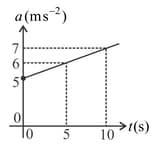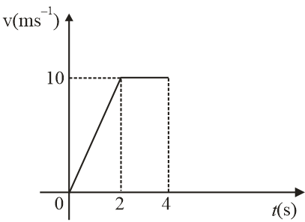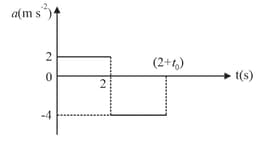A particle starts moving at along -axis from , with an initial velocity . The acceleration of the particle is linearly increasing as shown by its acceleration-time graph. Find the change in velocity of the particle during the time interval to . Also, find the final velocity of the particle at the time .



Important Questions on Basic Mathematics
A particle starts from the origin with uniform acceleration. Its displacement after is given in meter by the relation . Calculate the magnitude of its
Initial velocity
Velocity at
Uniform acceleration
Displacement at
A particle starts moving along the -axis from , its position varying with time as .
(a) At what time instant, is its velocity zero?
(b) What is the velocity, when it passes through the origin?
A particle moves along the -axis obeying the equation , where is in and is in .
(a) Find the initial velocity of the particle.
(b) Find the initial acceleration of the particle.
(c) Find the time when the displacement of the particle is zero.
(d) Find the displacement when the velocity of the particle is zero.
(e) Find the acceleration of the particle when its velocity is zero.
The speed of a car increases uniformly from zero to in and then remains constant (figure).

(a) Find the distance travelled by the car in the first .
(b) Find the distance travelled by the car in the next .
(c) Find the total distance travelled in .
A car accelerates from rest with for and then decelerates constantly with for second to come to rest. The graph for the motion is shown in figure.

(a) Find the maximum speed attained by the car.
(b) Find the value of .
